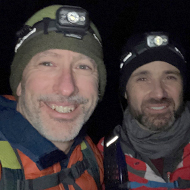
John Beel and David Abratt are taking on the Montane Lapland Arctic Ultra.
Two vets are set to embark on a gruelling trek across the Arctic circle - not once, but twice - to help save the rhino from extinction.
John Beel and David Abratt from Medivet will traverse 185km of snowy forests and icy lakes as they compete in the Montane Lapland Arctic Ultra, an ultra-race for runners, bikers, and skiers through the heart of Lapland.
Money raised by the trek will go towards the Wilderness Foundation's Africa's Forever Wild Rhino protection initiative – a global alliance of charities that aims to protect and connect wilderness, wildlife and people.
Having competed in numerous endurance challenges in the past, John and David are no strangers to the physical and mental demands of ultra events. They hope that the Lapland Arctic Ultra will present a novel challenge and a chance to see another part of the world - and hopefully the Northern Lights.
The event takes place 6-16 March, beginning and ending in the small town of Överkalix, and the pair are actively training and preparing for the environmental conditions – something that is not easy to achieve in the UK.
Dr Beel explains: “We have signed up for this gruelling ultra despite not being sure that we even like the cold, but the difficulty of the challenge to us is nothing in comparison to what this iconic species is currently facing. We have been lucky enough to work with this amazing animal, and we are determined to do all we can to help them survive.”
Dr Abratt adds: “Having grown up in South Africa, the cold will be very different to anything we’ve experienced before, so we’ll be packing lots of layers! We’re looking forward to crossing the Arctic Circle and experiencing the pristine landscapes and wilderness.”
At the time of writing, the pair had raised more than £1,800 of their £2,500 goal via their JustGiving page.
Image (C) Medivet.



 The Veterinary Medicines Directorate (VMD) is inviting applications from veterinary students to attend a one-week extramural studies (EMS) placement in July 2026.
The Veterinary Medicines Directorate (VMD) is inviting applications from veterinary students to attend a one-week extramural studies (EMS) placement in July 2026.